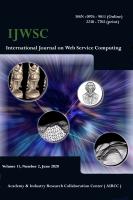COMBATING SOCIAL BOOKMARKING
POLLUTION
International Journal on Web Service Computing (IJWSC), (June 2012)DOI: 10.5121/ijwsc.2012.3201
Abstract
Social Bookmarking (SBM) is one of the most widely used Web services. An SBM website displays and shares
each user’s bookmarks. The SBM service aggregates the number of users who bookmark a given Web page
and provides useful information as a result of these aggregations. However, an increase in the popularity of
the SBM service and in the number of the users of the SBM service results in an increase in the amount of
SBM SPAM. In addition, the SBM service generates irrelevant information to many users because of the
aggregation of a large number of bookmarks; we call this problem "SBM pollution."
In this paper, we propose a method for countering the problem of SBM pollution based on the degree of
bookmark similarity. The proposed method creates blacklists that contain lists of users having a high degree
of bookmark similarity. Based on the created blacklists, the number of bookmarks of the Web pages
influenced by SBM pollution is reduced. From the results of the performance evaluation, we show that our
method reduces the number of bookmarks of most Web pages influenced by the SBM pollution to a great
extent.
